14 cryptocurrencies, the most popular digital currency today
Not all cryptocurrencies are created equal. Some are born with great technology. Others are born as a joke. There is a similarity between them, any virtual currency is only valuable to a certain group of people.
Like other types of assets (like stocks or real estate), its prices can fluctuate, creating sudden billionaires but also dangerous investments. Here are the most popular cryptocurrencies available today.
1. Bitcoin (BTC)

Bitcoin was born in 2009 by Satoshi Nakamoto - a rather mysterious person. For many people, talking about virtual money is referring to Bitcoin. Because of its brand value, all remaining virtual currencies are considered 'altcoins' - the alternative virtual currency to Bitcoin.
Bitcoin is revolutionary because it allows for peer-to-peer payments without the need for trusted third parties like the Central Bank. Instead, transactions are done through Blockchain technology. Blockchain is open source, this means that everyone can take the original code and generate new code with it. Developers have created hundreds of alternatives to Bitcoin and other applications of the Blockchain technology that comes with it.
Bitcoin is the first decentralized cryptocurrency to use Blockchain technology, controlling money supply or verifying transactions, distributed blockchain acts as the ledger of all transactions in Bitcoin history. This ledger allows a party to prove ownership of the bitcoins they are sending and prevents the Double Spend issue (spending the same amount twice) from being associated with previous forms of digital cash.
2. BAT-Basic Attention Token
This is one of the hottest cryptocurrencies in the past 4 years. BAT is an open source and decentralized broadcast exchange platform built on top of Ethereum. BAT was founded by Brendan Eich, co-founder of Mozilla Firefox and the Java programming language.
BAT was created for the purpose of accurately pricing user attention in the BAT platform. Advertisers pay BAT to website manufacturers to get users' attention.
Users use BAT through a single browser, Brave - an open-source, privacy-focused browser designed to block trackers and malware. BAT utilizes blockchain technology to securely anonymize and track user attention and calculate equivalent rewards for publishers.
3. Ethereum (ETH)
Ethereum is a platform that uses Blockchain technology to enable the creation of smart contracts. Smart contracts are pieces of code that can be written into the Blockchain, making them immutable. When you want to use a contract, you create a new transaction on the Ethereum Blockchain that references the contract and the network that verifies the transaction.
Ethereum is divided into two types of Ethereum and Ethereum Classic. Created by Vitalik Buterin and brought to market in mid-2015, it was touted as a virtual currency with more potential than Bitcoin with a market value of around $ 1.1 billion.
4. Litecoin (LTC)
Litecoin was launched in September 2011 by former Google employee Charles Lee as an alternative to Bitcoin. Users can also exploit and use it in exchange for products and services.
Litecoin is designed as an alternative to improve the speed and scalability of peer-to-peer transactions. Litecoin transactions are confirmed 4 times faster than Bitcoin using an easier Proof-of-work system. Faster transaction speeds mean Litecoin can support more transactions and lower transaction costs.
Litecoin also differentiates itself by using a memory-enhanced Proof-of-work system instead of a processing system like Bitcoin.

4. Bitcoin Cash (BCH)
Bitcoin Cash is a Bitcoin fork that was created to fix Bitcoin's scalability issues. The main difference is the adjustable block size in the Bitcoin Cash Blockchain chain. The default value is 8MB, which is 8 times the Bitcoin block size. The developers are conducting research to scale the block size to 1GB, allowing transaction throughput on the same level as major payment networks like Visa and Mastercard. Larger block sizes also lower transaction costs because more transactions will fit within a block at the same time.
However, the downside of Bitcoin Cash is that the larger block size requires a much more powerful processing power to verify and control a larger mining pool, making the decentralized nature of the Blockchain difficult and easy to hack. than.
5. BNB - Binance Coin
Binance launched the virtual currency market in 2017. It was originally a virtual currency used to pay for travel expenses, airline tickets and even virtual gifts.
On April 24, 2019, Binance officially completed the Binance Chain Mainnet and started supporting BNB running on the Binance platform.
Currently, BNB is used to pay for all types of transactions on the Binance bitcoin trading platform, used in the token sale programs held on Binance Launchpad.
6. Ripple (XRP)
Ripple is a platform designed to quickly and easily transfer money between countries. Ripple uses its own cryptocurrency called Ripple for the purpose of recording transactions on the Blockchain ledger. Users convert their money to Ripple, need to transact on the Ripple Blockchain, and the receiver will convert the Ripple virtual currency into their currency. Ripple's blockchain does not use the same mining technique as other cryptocurrencies, instead relying on a fixed money supply currently held in Time-locked Contracts.
7. Monero (XMR)
Monero is designed to address privacy issues when using Bitcoin. Since Bitcoin uses a transparent Blockchain, anyone can track Bitcoin transactions for traceability, which can be linked to an individual's identity based on IP address or other information. Monero encrypts data about the sender, the receiver, and the amount sent, so no one can trace the currency.
8. Zcash (ZEC)
Zcash is a privacy-focused, virtual currency, and uses a concept known as zero-knowledge proof to protect sensitive information for each party. It also implements a view key, allowing the user to view information, but not editing permissions. For example, someone has a key to view your account but can't spend.
9. Cardano (ADA)
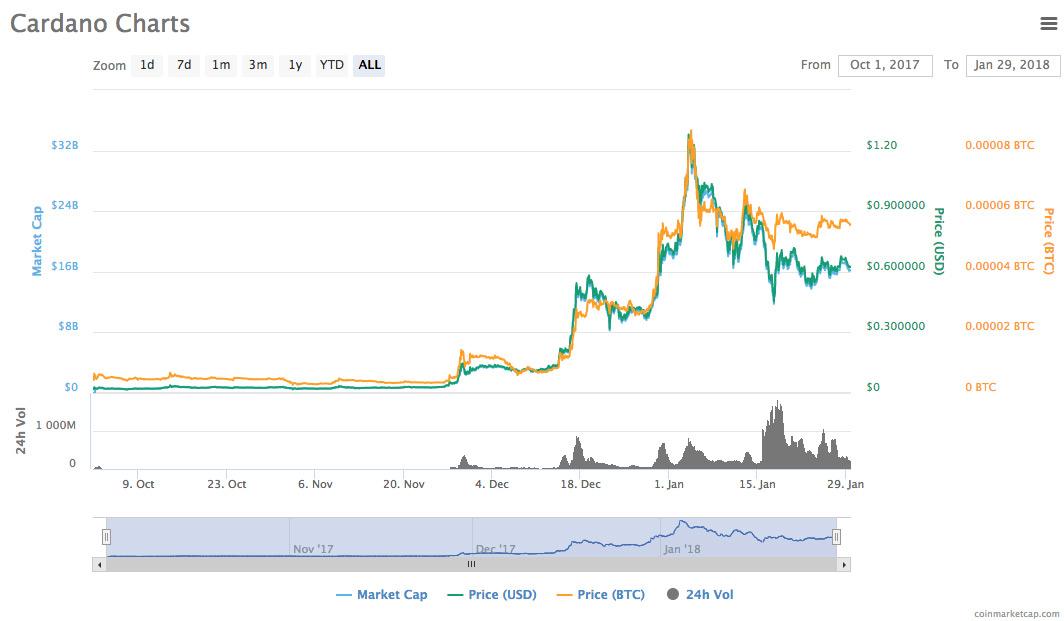
Cardano is another platform used to send and receive digital money, using its digital token, ADA. Similar to Ether, the Cardano network runs decentralized applications on the Blockchain.
It was created by Ethereum co-founder Charles Hopkinson in 2015 and is sometimes referred to as "Japan's Ethereum" because 95% of Initial Coin Offering (ICOs) projects are notorious. Japan. Cardano is managed by an international team of scientists and scholars specializing in Blockchain technology.
10 . Stellar (XLM)
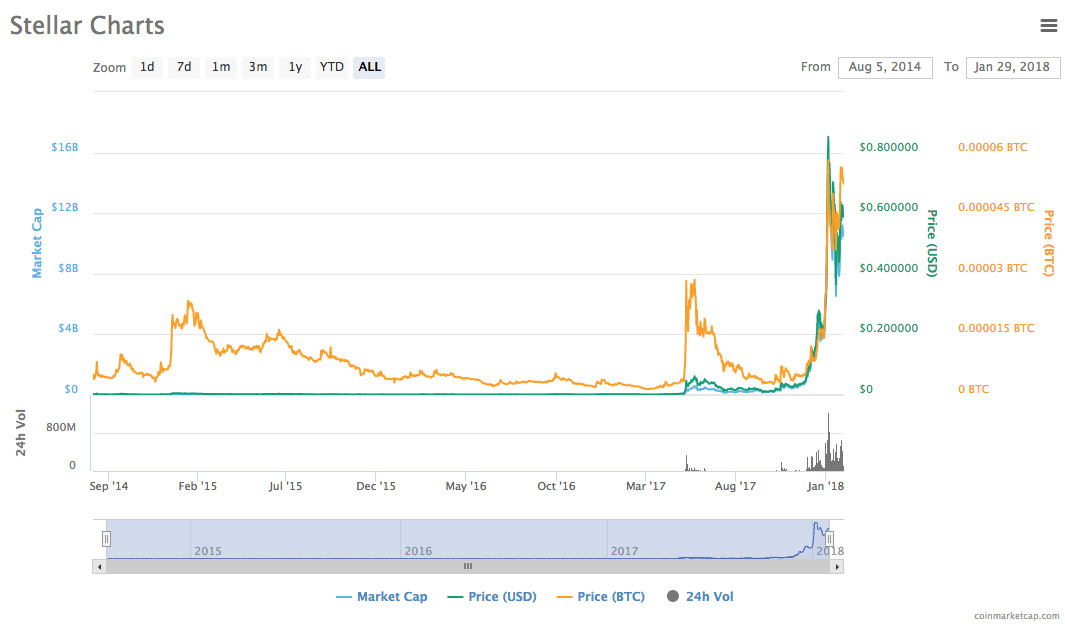
Stellar is a fork of Ripple, Stellar was launched in 2014 by Ripple co-founder Jed McCaleb and former attorney Jouce Kim following internal disputes with Ripple. Like Ripple virtual currency, Stellar is a network of fast and efficient money transfers across borders with the network being completely open source.
11. NEO
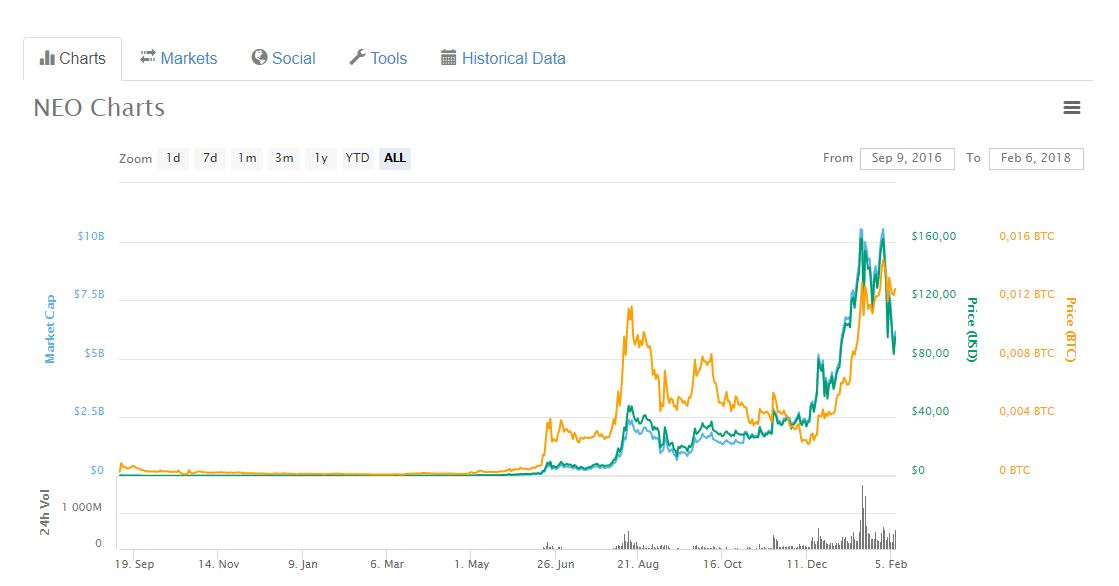
NEO is an emerging platform and digital token that enables the development of smart contracts and assets on the Blockchain. This cryptocurrency is compared to Ethereum because the two platforms share similar roles and goals.
12. EOS
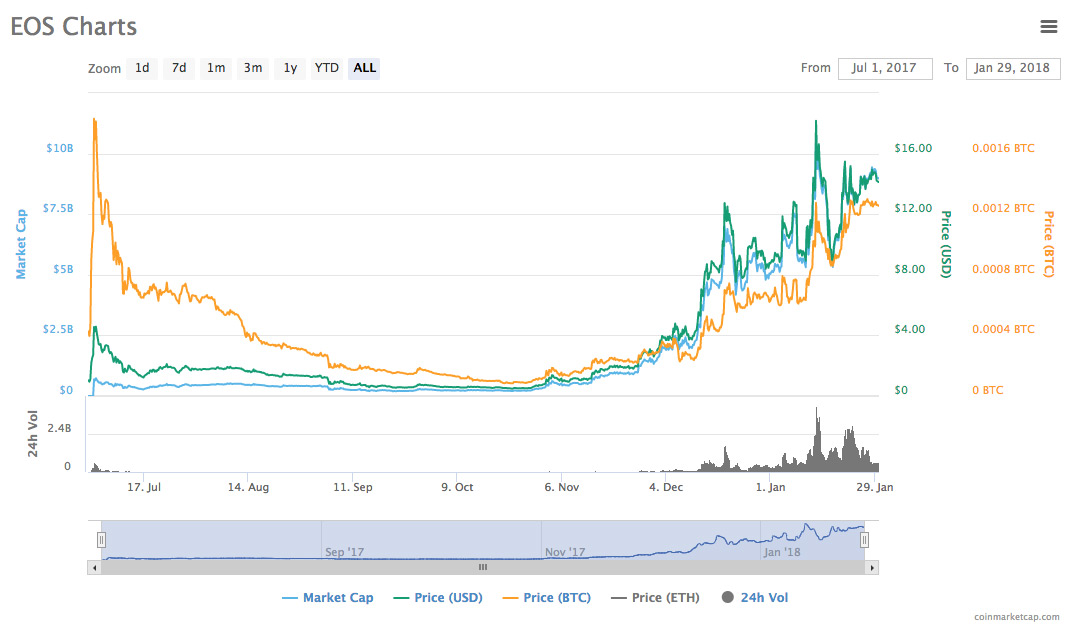
EOS is another Blockchain platform aimed at eliminating Ethereum, created by Bitshares founder Dan Larimer and the world announcement at Consensus 2017. The platform was created to bypass Ethereum's low transaction count on per second, which the founders of EOS believe is not high enough to support the 'Internet of things' in the future. EOS boasts a maximum of 50,000 transactions per second, which would make it ahead of both Ethereum and VISA in terms of speed.
13. NEM (VIEW)
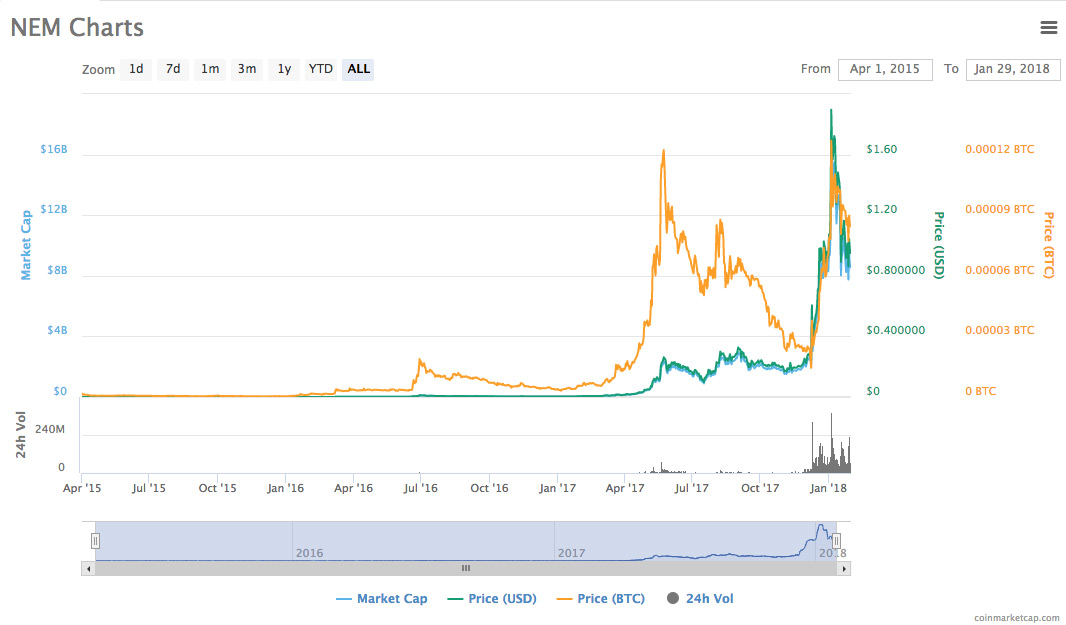
NEM is a Blockchain and virtual currency distributed with XEM token. The NEM platform acts as a server and client infrastructure based on Java and Javascript, and XEM is built on the Eigentrust ++ algorithm.
14. TRON
TRON was founded in September 2017, and is run by Justin Sun. TRON acquired Bit Torren a few years ago.
Since its inception, TRON has more than 300,000 accounts, relatively few compared to its competitors, but the growth of this coin is quite impressive.
The purpose of TRON coin creation is to help people build a free entertainment content system around the world. TRON allows users to freely publish content, release data, distribute digital assets . thereby forming an extremely diverse and rich entertainment content system.
You should read it
- ★ Ethereum phishing attacks help criminals earn $ 15,000 in 2 hours
- ★ The father of C ++ was not happy about Bitcoin being written in the language he created
- ★ 5 tips to help you stay safer when investing in cryptocurrencies
- ★ What kind of virtual currency do tech billionaires own?
- ★ Comparing Bitcoin and Litecoin: POW vs. Scrypt